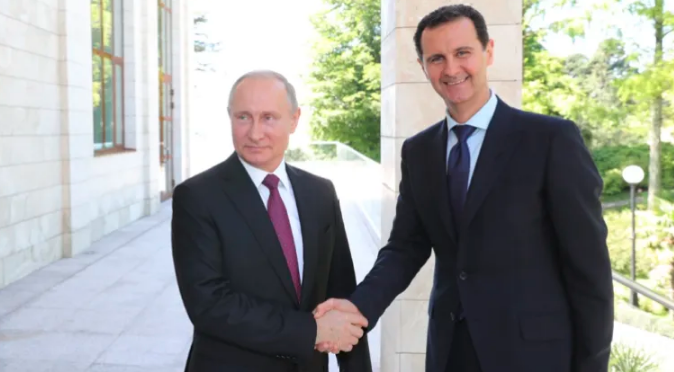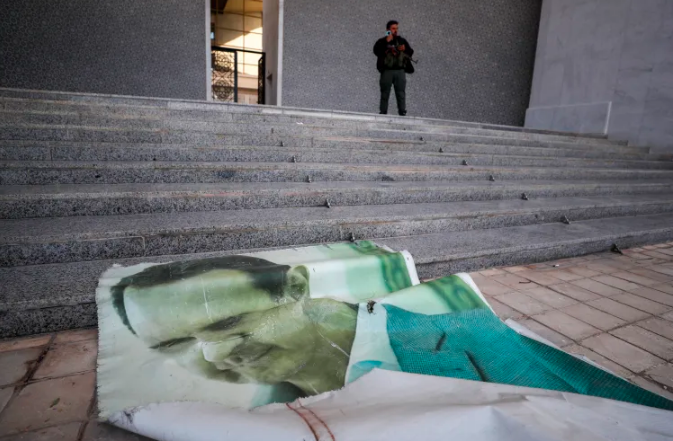The news of Russia giving asylum to Bashar al-Assad shocked the world. This move has shaken the global scene. It also raises big questions about Syria’s future and the region’s stability.

The Syrian conflict has been a big problem for years. The world has been trying to solve it, but it’s hard. Russia’s decision to help Assad has made things even more complicated.
This move will have big effects, not just for Syria but for the whole Middle East. Everyone is waiting to see how this will change the Syrian war and the region.
Keep Reading:
US Announces Air Strikes on ISIL Targets in Syria
Breaking News: Russia gave asylum to deposed Syrian President al-Assad
Russia has made a surprising move by granting political asylum to Bashar al-Assad. This decision comes as Syria is in the midst of a long civil war. The country faces a severe humanitarian crisis, with the regime under pressure from many sides.
This move is seen as a strategic choice by Russia, a key ally of Syria. Russia’s support has been crucial in keeping the Assad regime in power. This development strengthens their bond and could change the conflict’s course and the region’s politics.

The world has reacted with worry and criticism to this decision. Many doubt the wisdom of giving asylum to a leader accused of human rights abuses. The crisis in Syria has worried everyone, and this move is seen as making things worse.
Historical Alliance Between Russia and Syria Under Assad
The bond between Russia and Syria goes back to the Cold War. The Soviet Union supported the Assad regime back then. This partnership has lasted for decades, influencing the middle east conflicts and the Syrian civil war.
Under Hafez and Bashar al-Assad, Syria became key for Russia. They both wanted to counter Western influence and keep a balance in the middle east. Russia’s move into the Syrian civil war in 2015 made their alliance stronger. Moscow aimed to help the Assad government and keep its influence in the area.
Both Russia and Syria share similar views on democracy and human rights. They see Western efforts to promote these as a threat to their rule. This has made them allies in resisting outside pressure.
Russia’s support for Assad in the Syrian civil war has increased tensions in the middle east. The partnership between Moscow and Damascus is a big player in the region’s conflicts. It affects the balance of power between global powers.
Putin’s Strategic Motivations Behind Offering Asylum
Russian President Vladimir Putin decided to give asylum to Bashar al-Assad. This shows the Kremlin’s big plans for the Middle East. Putin wants Russia to be seen as a major player, opposing Western interests.
Putin’s support for Assad comes from a long friendship between Russia and Syria. This friendship goes back to the Cold War. Putin’s goal is to keep Russia strong in the Mediterranean and help Assad’s government.

Putin’s move also fits his policy of protecting authoritarian leaders. By helping Assad, Putin tells other leaders that Russia will support them. This is even if the world doesn’t agree.
At home, Putin’s actions might make him more popular. Russians who like a strong Russia might support him more. This could help Putin stay in power.
But, Russia’s actions in Syria have made things more tense. People worry about what Putin’s plans might do. The situation in Syria is still very unstable.
Impact on Syrian Civil War and Regional Stability
Russia’s decision to give asylum to Bashar al-Assad could change the Syrian civil war and Middle East stability. This move might shift power among conflict groups. It could also affect the chances of a peaceful end to the war.
The Syrian civil war is a long and complex crisis. Many countries, like Russia, Iran, Turkey, and the U.S., are involved. Al-Assad’s stay in Russia could strengthen his position. This might make finding peace harder.
Stability in Syria could also affect other countries in the region. The crisis could lead to more refugees, terrorism, and conflict. The world must consider these risks.
The situation in Syria is still changing. The world is watching how Russia’s move will affect Assad’s position. The future of peace in Syria and the Middle East’s stability depend on this.
International Community’s Response to Russia’s Decision
The world has mixed feelings about Russia’s choice to give political asylum to Bashar al-Assad. Western countries, like the U.S. and its European friends, are very upset. They see it as a clear effort to support a regime known for human rights violations and a big humanitarian crisis in Syria.
United Nations Secretary-General Antonio Guterres is not happy. He thinks this move could make things worse in the area and hurt chances for peace in Syria. Turkey and the Gulf Cooperation Council also disagree, saying Russia’s actions hurt the Syrian opposition and make life harder for Syrians.
But Russia stands by al-Assad, saying it’s because of their long friendship and strategic goals in the area. The Kremlin says it’s doing the right thing by helping a leader it sees as rightful and in charge. This has made things more tense between countries and raised worries about Russia’s growing role in the Middle East and the Syrian war getting worse.






